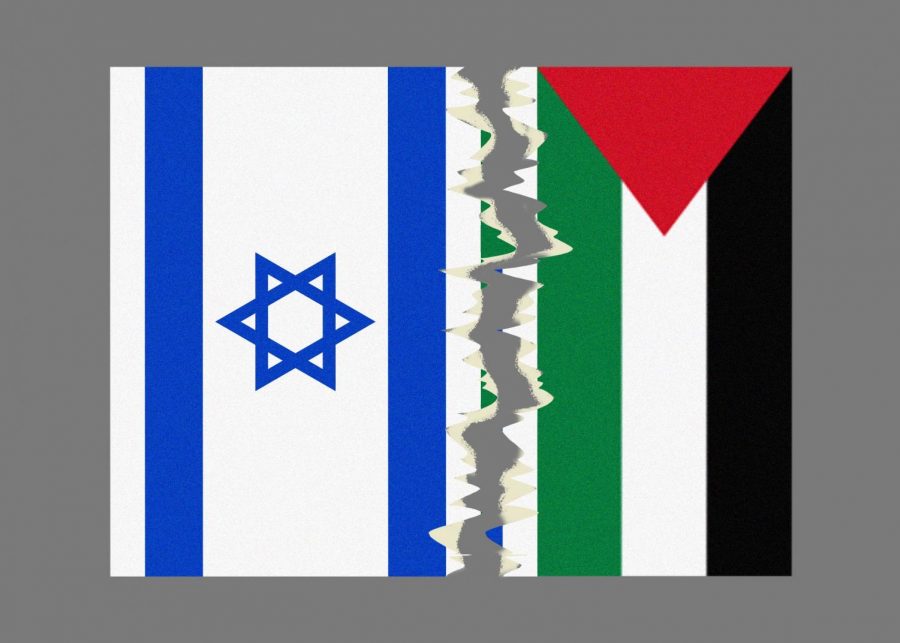The Israeli-Palestinian conflict: When will it end?
The growing divide forming between Israelis and Palestinians is leading to violence and protests. President Trump declared Jerusalem Israel’s capital and made a decision to move the American embassy from Tel Aviv to Jerusalem late last year.
February 6, 2018
The Israeli-Palestinian conflict is one of the most controversial, long-standing and violent confrontations in the modern era. That is why it is crucial for the public to be aware of the complex politics and history surrounding the topic.
After World War II, international support skyrocketed for an independent Jewish state because of the persecution they faced at the hands of Nazis. Because of this, the U.N. divided modern day Israel into two parts, one for the Jews and one for the Arabs. The Jews appreciated this decision to grant them land, whereas the neighboring Arab states regarded the decision as a European encroachment on Middle Eastern affairs. Shortly following Israel’s declaration of independence in 1948, five neighboring Arab states declared war on Israel in an attempt to unify the region under Arab rule. The new state of Israel not only won the war but also spread beyond its original borders decided by the U.N., expelling large numbers of Palestinians from their homes.
In 1967, the Arab states and Israel fought once more in a war known as the Six-Day War. By the end of the war, Israel had taken over all of the once-Palestinian territories and the Sinai Peninsula from Egypt.
The source of much of today’s conflict is the number of Jewish settlers moving into Palestinian territories.
The United States’ role in the conflict was additionally complicated when President Trump declared Jerusalem the capital of Israel. This news dismayed many Palestinians who wanted East Jerusalem to be their capital, as it houses holy sites for both Muslims and Jews.
Honors Modern International Affairs teacher Damon Halback believes that Israel and Palestine have no choice but to negotiate some kind of compromise to achieve peace.
“I wish I had a magical bullet to resolve this conflict, but I don’t,” Halback said. “Both sides have some intractable positions involving things such as the West Bank and the Gaza Strip to settlements and the recognition of Israel, so the only pathway available requires compromise from both sides.”
Yehiel Grenimann, an Austrian-born rabbi working with human rights organization “Rabbis for Human Rights,” believes the Israelis and the Palestinians are growing more and more polarized and that this has made peace harder to achieve.
“[Israel] is moving increasingly to the right of the political spectrum, which has complicated the peace process,” Grenimann said. “This move is precisely why a one-state union would be the framework for civil war in the future.”
This piece was originally published in the pages of the Winged Post on February 5, 2018.


















![“[Building nerf blasters] became this outlet of creativity for me that hasn't been matched by anything else. The process [of] making a build complete to your desire is such a painstakingly difficult process, but I've had to learn from [the skills needed from] soldering to proper painting. There's so many different options for everything, if you think about it, it exists. The best part is [that] if it doesn't exist, you can build it yourself," Ishaan Parate said.](https://harkeraquila.com/wp-content/uploads/2022/08/DSC_8149-900x604.jpg)




![“When I came into high school, I was ready to be a follower. But DECA was a game changer for me. It helped me overcome my fear of public speaking, and it's played such a major role in who I've become today. To be able to successfully lead a chapter of 150 students, an officer team and be one of the upperclassmen I once really admired is something I'm [really] proud of,” Anvitha Tummala ('21) said.](https://harkeraquila.com/wp-content/uploads/2021/07/Screen-Shot-2021-07-25-at-9.50.05-AM-900x594.png)







![“I think getting up in the morning and having a sense of purpose [is exciting]. I think without a certain amount of drive, life is kind of obsolete and mundane, and I think having that every single day is what makes each day unique and kind of makes life exciting,” Neymika Jain (12) said.](https://harkeraquila.com/wp-content/uploads/2017/06/Screen-Shot-2017-06-03-at-4.54.16-PM.png)








![“My slogan is ‘slow feet, don’t eat, and I’m hungry.’ You need to run fast to get where you are–you aren't going to get those championships if you aren't fast,” Angel Cervantes (12) said. “I want to do well in school on my tests and in track and win championships for my team. I live by that, [and] I can do that anywhere: in the classroom or on the field.”](https://harkeraquila.com/wp-content/uploads/2018/06/DSC5146-900x601.jpg)
![“[Volleyball has] taught me how to fall correctly, and another thing it taught is that you don’t have to be the best at something to be good at it. If you just hit the ball in a smart way, then it still scores points and you’re good at it. You could be a background player and still make a much bigger impact on the team than you would think,” Anya Gert (’20) said.](https://harkeraquila.com/wp-content/uploads/2020/06/AnnaGert_JinTuan_HoHPhotoEdited-600x900.jpeg)

![“I'm not nearly there yet, but [my confidence has] definitely been getting better since I was pretty shy and timid coming into Harker my freshman year. I know that there's a lot of people that are really confident in what they do, and I really admire them. Everyone's so driven and that has really pushed me to kind of try to find my own place in high school and be more confident,” Alyssa Huang (’20) said.](https://harkeraquila.com/wp-content/uploads/2020/06/AlyssaHuang_EmilyChen_HoHPhoto-900x749.jpeg)








